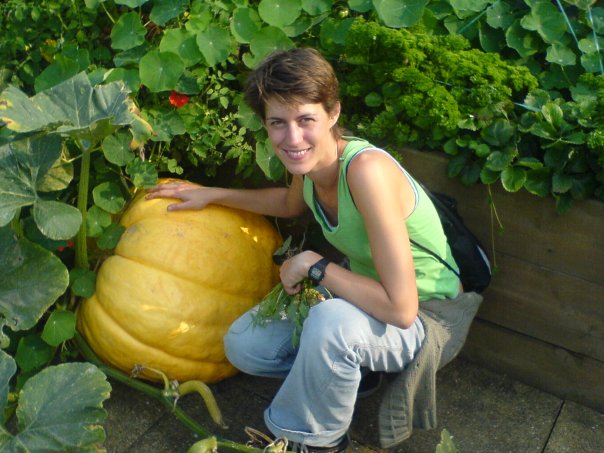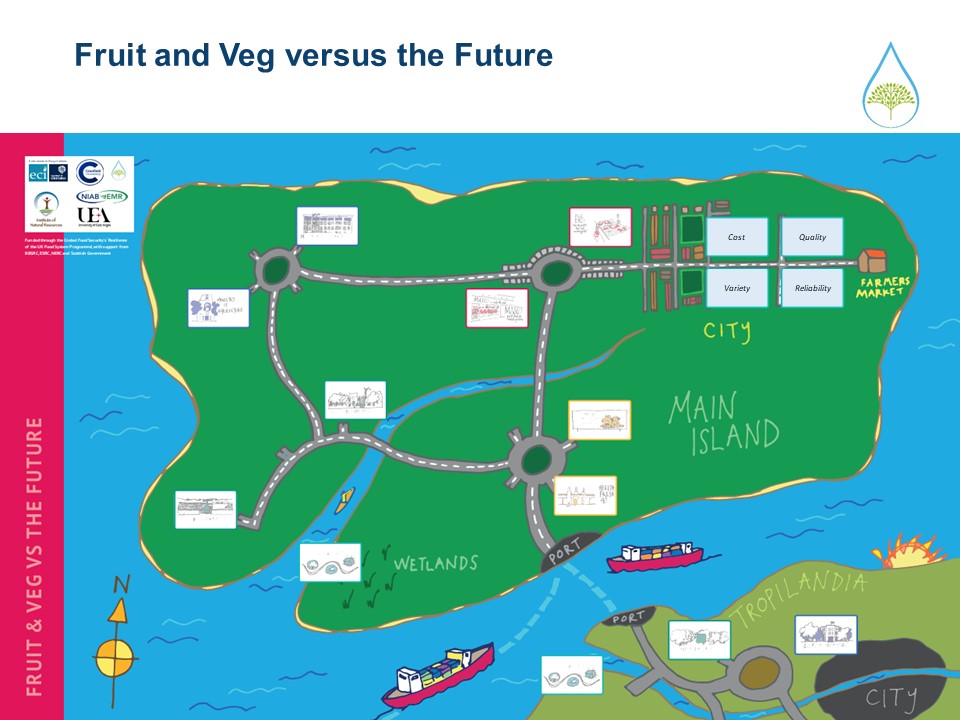A sit down with Chloe Sutcliffe
06/01/2020

Can you introduce yourself?
I’m Chloe, I’m a social scientist working as a Post Doctoral Research Fellow at Cranfield. I’ve been here 3 years and I’m currently working on a project looking at ways of increasing resilience to water-related risks in the UK’s fresh fruit and vegetable supply.
What drives your research?
My first degree was in Social Anthropology. I’ve always been interested in how other people think and see the world. I find it fascinating that there are so many people in the world and everybody has their own unique point of view. Having worked in horticulture for a few years before doing my PhD, I’m also very passionate about the environment, and I especially love growing and eating fruit and veg, so this project has been pretty much perfect for me!
There are things that are evident about the way society operates currently that are not sustainable for the future. So working out how people can understand each other better or be better connected in order to work towards addressing some of those issues is a key part of what I do.
Can you tell me a bit about your research?
So this research is one of a number of different projects that have been funded by the UK Research and Innovation Global Food Security Programme looking at the resilience of the UK’s food system in a global context.
Initially we used trade and production data to look at all the fruit and veg coming into the UK from around the world and then we calculated the water scarcity footprint (WSF) for that fruit and veg. So, we looked at how much water is used to irrigate different fruit and veg crops in different areas, and combined that with a value for water scarcity in the areas where those crops are being grown. We were then able to come up with figures to show how the water scarcity impacts of the nation’s fruit and veg purchasing and sourcing habits have been changing over time.
As well as that global overview, the other parts of the project have looked in more detail at production and supply chains. We’ve done two case studies at a farm level, one with fruit and veg growers in the UK, and one with South African farmers growing fruit for export. These case studies have aimed to understand how growers perceive water risks and make irrigation decisions. We’ve also interviewed stakeholders from across the fruit and veg supply chain.
Cranfield has partnered with several of other institutions to undertake this whole project; the Environmental Change Institute at the University of Oxford, the [University of East Anglia, and NIAB-EMR in the UK, and the Institute of Natural Resources in South Africa, so I’ve had the chance to get to know researchers and consultants with a range of different skills, academic backgrounds and expertise, so it’s been really interesting professionally.
What have you done with all this data?
Based on all this we designed a board game which we’ve played with people working for different supply chain organisations as a way to help them think about how water risks get moved around the whole system. The idea is that in the process of playing the game they may come up with ideas about how they could co-operate or manage things differently to reduce the potential negative impacts of water risks. If people do what is in their own best short-term interests it often has a negative impact elsewhere in the system. So encouraging everyone to think a bit more about the system as a whole can help them make choices that will build resilience. And getting different people together to play the game is of course good fun!

What are the biggest challenges?
Coming from a social science background you are in the minority at Cranfield as most people are from the natural sciences. This gives you opportunities but it’s also a challenge as your knowledge and your scientific expertise are sometimes viewed differently.
A lot of the research done at Cranfield is quite applied, developing new technologies or ways of doing things. This new technology needs to be acceptable to people and meet their needs so it can be taken up by society at a wider level so there is quite a lot of scope for social scientists to contribute to funding bids.
What do you really enjoy about your job?
It’s great to be doing a job where I get to meet and interview different people and make sense out of their thinking about their role in the world. I also get to write, which I really enjoy doing. Because I tend to work on interdisciplinary projects that employ mixed methods I get quite a lot of variety in terms of the data processing and analysis that I do. It’s a good mix of number-crunching, which I find satisfying, and then dealing with the messier, more complex nature of how individuals perceive and construct stories about the issues that are important to them, which I find really interesting. It’s then challenging but rewarding to find ways of bringing together the different types of data I work with in order to communicate research findings.
I also really like the people that I work with. Cranfield is full of talented and driven people who also mostly happen to be very friendly and down to earth!
In particular it has been good to meet and work on developing bids for new research projects with people from very different disciplinary backgrounds, and work out how skills from different disciplines can be brought together to address real world problems, which is one of the things I think Cranfield as an institution is especially good at doing.
What else do you do in your role?
I teach lectures on two MSc modules and I’ve also supervised MSc students writing their dissertation projects. It isn’t a massive part of my role but it’s been great to have the opportunity to develop my teaching and mentoring abilities and to engage with students who are developing their skills in new directions.
I find the postgraduate students very focused, they have made the choice to come and study here as they know it will be useful to them in their careers, so it’s quite different to teaching undergrads.
One of the modules I lecture on is ‘Drought and Water Scarcity’, part of the Environmental Water Management MSc. My lecture focuses on the relationships between water scarcity and food security and explores some of the different research methods that can be used to help understand water risks in food systems. The second module I teach on is from the Future Food Sustainability MSc and is called ‘Water and Sustainable Agrifood Systems’, so this year we may take the fruit and veg board game to play it with the students.
I feel like I’m bringing a slightly different perspective with the lectures I give as they are much more social science focused. It’s an opportunity to encourage students to look at things in a way that may be new to them.
Categories & Tags:
Leave a comment on this post:
You might also like…
Introducing… Bloomberg Trade Flows
Are you interested in world trade flows? Would it be useful to know which nations are your country's major trading partners? If so, the Bloomberg terminal has a rather nifty function where you can view ...
Cranfield alumni voyage to the International Space Station
Seeing our alumni reach the International Space Station (ISS) has a ripple effect that extends far beyond the space sector. For school students questioning whether science is “for them”, for undergraduates weighing their next ...
From classroom to cockpit: What’s next after Cranfield
The Air Transport Management MSc isn’t just about learning theory — it’s about preparing for a career in the aviation industry. Adit shares his dream job, insights from classmates, and advice for prospective students. ...
Setting up a shared group folder in a reference manager
Many of our students are now busy working on their group projects. One easy way to share references amongst a group is to set up group folders in a reference manager like Mendeley or Zotero. ...
Company codes – CUSIP, SEDOL, ISIN…. What do they mean and how can you use them in our Library resources?
As you use our many finance resources, you will probably notice unique company identifiers which may be codes or symbols. It is worth spending some time getting to know what these are and which resources ...
Supporting careers in defence through specialist education
As a materials engineer by background, I have always been drawn to fields where technical expertise directly shapes real‑world outcomes. Few sectors exemplify this better than defence. Engineering careers in defence sit at the ...






